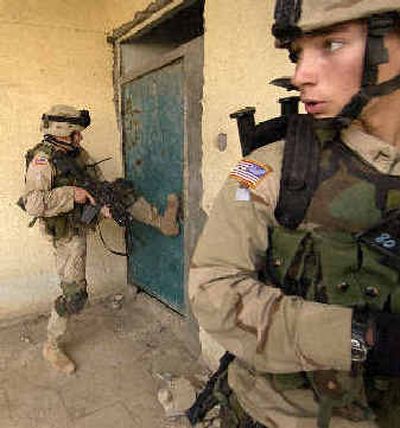Iraqis to vote Jan. 30

BAGHDAD, Iraq – Iraq’s government Sunday set Jan. 30 for the country’s first democratic elections, despite a boycott threat by the country’s Sunni Muslims and signs that the insurgency that threatens the safety of the vote is spreading.
The independent electoral commission announced that voting would be held on schedule and in all parts of the country, including the violence-racked Sunni Triangle where the insurgents’ grip is strongest.
Even as the election date was being announced, violence erupted Sunday in the western town of Ramadi, another front line in the war against the insurgency. At least eight members of the Iraqi national guard were killed in an ambush, according to the Associated Press, and three civilians were killed by U.S. forces after their driver failed to stop at a checkpoint, the U.S. military said.
A 15,000-strong U.S.-led force stormed the insurgent-held stronghold of Fallujah this month in a bid to restore stability for January’s elections. But while the assault succeeded in taking the city, there are complaints that the attack may have made matters worse by scattering insurgents elsewhere and enflaming Sunni sentiments.
Since the Fallujah offensive, fighting has erupted in the northern city of Mosul as well as in Baghdad and other Sunni Triangle cities.
The demands of mopping-up and reconstruction operations in Fallujah have made it increasingly likely that more combat troops will be needed to handle fighting elsewhere, according to unidentified senior U.S. commanders quoted in the Washington Post.
Ayad al-Samarrai of the Sunni-led Iraqi Islamic Party said his party wants to participate in the elections but will boycott them unless they are delayed.
“From a practical point of view, it is impossible to hold elections now and the government can’t give a promise the situation will be safe enough to hold elections by January,” al-Samarrai said. “Under the current situation, millions of people would be unable to vote either because they oppose the election or because it’s not safe.”
The only other major Sunni group, the Association of Muslim Scholars, has already announced it will boycott the election to protest the assault against Fallujah. The association has been joined in its boycott by 46 smaller political parties and groups, most of them Sunni, leaving Sunnis with no party representing their interests if the vote is held as scheduled.
Jan. 30 is the last date on which the election can legally be held according to a United Nations Security Council resolution passed last June that lays out the timetable for Iraq’s transition to democracy.
But it is still possible that the poll could be delayed if the government asked the Security Council for a new resolution, officials say.
Speaking in New York on Friday, Iraq’s U.N. Ambassador, Samir Sumaidaie, said he thought there was a “good chance” the election could be held by January.
But he also held out the possibility of a delay. “If … at that time it is determined that we need a bit more time, then I think the situation will be reviewed,” he said.
Iraq’s interim government, appointed in June by the outgoing U.S. administration in Baghdad in consultation with the United Nations, has repeatedly insisted that the election will be held on time and that any delay would be damaging for the credibility of Prime Minister Ayad Allawi and his administration.
In a statement welcoming the election date Sunday, Allawi said the restoration of stability would be his top priority ahead of the voting.
“The government is determined that the security arrangements allow for elections to take place across the whole country, and that all Iraqi citizens can vote,” he said.
An earlier proposal, that the election be held on schedule in those parts of the country that are peaceful and delayed elsewhere, has been rejected, the election commission said.
Iraq’s majority Shiites, who account for about 60 percent of the population, are opposed to any delay in an electoral process that promises to give them a leading role in government for the first time in history.
“If we delay the elections, we are giving the insurgents fuel and showing them they achieved a victory against the state,” said Adnan Ali, a spokesman for the Shiites’ Dawa Party.